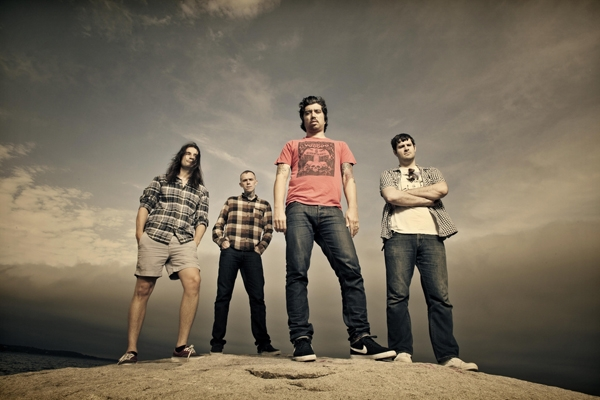Converge: The Kurt Ballou Interview
Music Interviews
I sat down with Kurt Ballou, guitar mastermind of Converge and recording guru of Godcity Studio, before their show Oct. 10 in Denver. It was a cold snowy day and the band got in late, so I was stoked that Kurt took the time to give an interview. He had a lot to say. We got to talking about high school bands, solar powered cars and of course, the new Converge album and touring with Dethklok.
SLUG: How was the show last night?
Ballou: The show last night was actually really good. I’ve been going to Salt Lake since I was 12 and it was my first time ever actually getting to go to the lake itself, so that was kinda neat. I tried to ride my bike on the Salt Flats but that didn’t work so well. It was sort of like quicksand. It was easy going straight and smooth, but as soon as you tried to turn or put force into cranking, all of a sudden it would suck you into the sand. [As for] the show for us.
We’re a band used to doing our own thing. Doing a support tour like this is not common for us. It’s an interesting experience. It’s a challenge playing to someone else’s audience, it forces us to try to play better and it keeps us in check. All of the shows, especially Salt Lake, have been surprisingly good for us. I was expecting a less warm reception from the audience. I was expecting mostly people who’d know about Dethklok through Adult Swim and don’t necessarily know anything about a hardcore band like us, or might not know much about underground music.
Despite ticket prices being a lot higher than what a Converge show usually is, it’s actually been a lot of people who clearly know our material at the shows. They’ve made for pretty good shows. You know, they’re not like normal Converge shows because there’s a barricade and we feel pretty separated from the audience.
SLUG: How is that for you guys? Whenever I’ve seen you play it’s always in the kind of venue where there’s not a huge line between the audience and you guys.
Ballou: Yeah, that’s what we prefer. As we’re getting older, our physical recovery is slower, there’s a little bit of personal space that we require. We grew up going to shows where there was really no clear delineation between the band and the audience, during the actual time of the show and also in terms of the community.
Like, I go to a show on Friday and watch Timmy’s band play and I’m in the crowd and I’m singing along with his band and then on Saturday, Timmy’s in the crowd watching my band. That’s kind of the way it was. There was sort of a communal sense between audience and the bands playing. As we age, we get a little bit removed from that, but it’s definitely the kind of feeling that we like at our shows and it’s something that we kind of thrive on. In that, also I think that we sound better at those shows where there’s a visual energy to kind of lead your ear to hearing things sonically.
A band like Converge, we’re really fast and really dense and we’re moderately sloppy live, so like at a big room like where we played yesterday, the Saltair, a big room like that doesn’t really lend itself to fast music. So, you couple that with being on a big stage and being really separated from the audience, it puts more emphasis on the sound of the performance and less on the visual excitement.
But, when you’re in a smaller environment, the sound is less important and the visual excitement is more important, I think. I think we’re better suited to that because we’re not like a super professional band, we don’t have our stage show down, we don’t have like a lighting guy that’s got a bunch of stuff in sync with what we’re doing. That’s cool, Dethklok does that and it works really well for them, it’s not really what we do, so we’re definitely out of our element here. Like I said, we enjoy the challenge.
SLUG: In terms of it being a different audience, how do you expand that punk rock ethos? What do you hope people take away, other than just getting a chance to experience your music?
Ballou: Well, I think about it a lot in terms of the younger people, because everyone needs stepping-stone music. In my generation there was rap and then there was bands like Jane’s Addiction, Sonic Youth, Pixies, that started to get big. My generation was the first generation that ever had Headbangers Ball.
We had the Bay Area thrash stuff that would sometimes come on. Headbangers Ball was like our stepping stone towards punk rock. We also had skateboarding, so we had Thrasher covering the punk rock stuff. So those were sort of like our stepping stones into hardcore. And then the generation after us had like Nirvana and Mudhoney and Pearl Jam and stuff like that, and then subsequent generations have this stepping-stone music. So a band like Dethklok and Mastodon, where they’re awesome in their own right, but they’re pretty inaccessible sonically and I’m actually surprised that that kind of band is as popular as it is.
But those bands are pretty easily, in terms of acquiring the music, it’s easily accessible, I’m not saying it’s sonically easily accessible, I’m saying that it’s there for people that are looking for something. It’s not something that you have to dig hard to find. Whereas the hardcore stuff I got into as a kid was something you have to dig hard to find. You need this kind of stepping-stone music to inch you into this underground stuff.
It inches you in by training your ear to hear more non-traditional sounds and tones and harmonic structure, and also through the network of bands that know each other and respect each other and are friends and put each other on their thanks lists and so forth and so on. You can find your way into underground music through that. So, obviously, Mastodon are a much bigger band than us, but we’ve been friends with them since they started that band.
So a kid who’s 14 or 15 and knows about Mastodon, they come to a Mastodon show and maybe they see Converge and maybe they see something there that appeals to them. They look up Converge on the internet, then they see these other bands that Converge’s toured with and they know Converge is on Epitaph, and Jake from Converge runs Deathwish Records, so let me look into that, and then they see all the other bands.
All of a sudden, a couple years go by and they’re fully into this underground scene. I kind of think about these big tours as a way of promoting where we’re from and bringing hopefully some people that truly have that spirit in them back to the roots of our music. It’s not so much about us trying to grow, or us trying to get more popular. It’s more trying to bring an audience to us rather than us go to the audience.
SLUG: Show them that there’s somewhere for them to go if they were searching for something like that.
Ballou: When I used to go to shows when I was a kid, I always left with something to think about. I feel like you don’t leave shows with something to think about very often anymore. Hopefully there’s some new ideas that get exchanged when people come to see a band like us.
SLUG: You mentioned that musically, Dethklok and Mastodon are kind of inaccessible, and I’ve heard you say in the past that your music is inaccessible, at least from the musical standpoint. What would you lend the growth of music like that to? Because you guys, especially for being a hardcore band, in the grand scheme of things, are pretty big. So, why do you think that’s come about? Why has that struck a chord at this point in musical history?
Ballou: I think it’s been a slow, steady growth. You can trace it back to between when Metallica put out “One” and when “Smells Like Teen Spirit” came out within that period of a couple of years, there was a pretty big shift in youth culture where the delineation between social classes started to get a lot more blurred, and I think that people became less concerned about where they fit in and little more concerned about setting themselves apart from other people. But then also, as this music’s grown, the ethos behind it hasn’t grown, it’s the aesthetic of it.
There’s skate culture, snowboard culture, all that stuff’s getting big, so people that market music, they see “Oh, this punk rock stuff is getting big.” They cherry-pick certain elements of that sound to market. You know, bands of our size and smaller, they have managers, they have PR firms that do all these fake ad campaigns in order to grow the band and get them onto different contests and shows and tours. There’s so much fake stuff that goes on in music.
If it’s kind of pushed on people, eventually they start to think it’s good. People like to, especially youth, like to think that they’re ahead of everyone else. They’re always craving the next thing. And it might not be any good, or might not even be better than the last thing, or any good at all, but it’s their own. Each generation is searching for some kind of thing that they can claim as theirs that sets them apart from the people who came before them. It’s a really broad question, there’s a lot of answers that contribute to it.
SLUG: Speaking of new things, you guys have a new album coming out on Oct. 20. How has it been playing those songs live on this tour? Is this your first major tour playing material from that album?
Ballou: We played a couple of songs on a tour last March before we recorded them, and they didn’t even have the same lyrics back then. It’s interesting. I really like the songs. I think I like listening to the album more than I like playing it, because from a guitar standpoint, it’s significantly harder than what we’ve done in the past. I think sometimes what happens is when you’re in a band for a long time, all of your easy ideas are taken eventually [laughter].
Or, even in heavy music in general. Someone in 2009 can’t go and write “Iron Man.” So all the easy heavy stuff’s already been taken, so to try to continue and be innovative and push your music forward, you end up forcing more and more complicated stuff. Granted, every once in a while a band will come along that’s super simple and heavy and it’s awesome. But, that’s not really my forte because I’m more of an analytical kind of person, not like a jamming kind of musician, so I end up writing stuff that’s pretty hard. Playing the new songs, a lot of them are hard for me to be really physical with them.
I know Converge is usually traditionally a pretty physical band, so I’ve gotta kind of put my head down and play and hold it together––which is a challenge for me, but I do enjoy it because I feel we’ve been, once you’ve played a lot of shows on a certain set of material, you just feel like you’re regurgitating. You start to feel more like an entertainer and less like an artist. I think that both are totally valid things to do. But, me personally, I’m more about the creation of new material than I am about the performance of old material. So, I do enjoy playing the new stuff more and hopefully when the record comes out, we’ll start adding more and more new songs to the set. It’s good. It’s fun to play, I like the record a lot.
SLUG: You guys have a lot of guest artists on the record. More so than anything you guys have done in the past. Was this your foray into a rap record type of deal?
Ballou: [Laughter] Those records… The rap thing, it’s like a marketing ploy because they’re trying to introduce a new artist. They get an established artist to feature on one of their songs. Converge is not a new artist, and none of the people that are featured on the record are a selling feature of the record.
Maybe to a few people, it wasn’t to us. With every record we do, we try to have something expressive of who we are at the time and within the confines of what Converge can be. We can’t go do a calypso record or something like that. But, within the confines of our skill sets and our collective taste, we try to explore as much ground as we can. Every record is always a new creative exploration for us. One of the ways to keep things fresh is to change your process or change around the influence, change around the ideas. There’s a lot of different ways to do it. We try to have a different process to writing every song.
Sometimes someone comes in with a complete song, sometimes it’s like a jam session. There’s material on this record that’s five years old that we’ve had kicking around for a while that we didn’t get around to completing. Every song’s in a different key. There’s a lot of different tunings that we use, actually going back to the previous question, having a lot of new tunings has made playing new songs hard, too because the more tunings I have, the more guitars I need.
It slows down the pace of the set. We had the set sort of fine-tuned prior to this, and now I feel like throwing these new songs in, it’s kind of hard to re-fine-tune the set. Back to the question I’m on, with the collaborators, it’s a way to keep things fresh. For example the last song we did on the record, “Wretched World,” which we did with Ghengis Tron, it was something that was started five years ago.
SLUG: You guys toured with them a few years ago?
Ballou: Yes, we have toured with them. I’ve recorded two of their records. They’re a great band. We have a lot of mutual understanding and respect for them. Whenever we do some kind of collaboration, we want to make sure it’s with someone we’re friends with that we have some mutual respect and musical taste with. We don’t want to turn over our music to someone we don’t trust just because they have some name we can put on a sticker on the front of the record.
With them we wrote the song five years ago. We tried actually jamming it with the Cave In guys and that reached an impasse where we had too many chefs in the kitchen. So we stripped away a lot of what they did and turned the tracks over to Genghis Tron and said, “Have at it, see what you guys come up with.” So they came up with a lot of the melodic structure, not the lyrics, but the melodic structure of the song and then that was fine-tuned.
We went back and forth a lot and eventually came upon the song you see on the album. It’s like a true back and forth collaboration where they wouldn’t have come up with that had we not gotten them started, and we wouldn’t have come up with what we came up with had they not jump-started our creative process. Sometimes it’s easier to take an idea from 20 percent to 100 percent than it is to take it from zero to 100.
I feel like that all the time when I’m recording bands. I might be completely dry with ideas, but as soon as someone does one little thing, that flips a switch in my brain and then all of a sudden I’m prolific and can go. Like, right now, I’ve got zero musical ideas in my head in terms of new material, but as soon as I hear one little thing it will get me going. [Takes Care of Gear]
SLUG: I’ve thought about your music process since you have so many ideas going on. How many different tunings do you use? Are they things that you have come up with, or are they things that you’ve seen that you think would be neat to bring in?
Ballou: No one else has really taught me much about guitar, most of them are things that I’ve come up with and they’ve been like, in a lot of cases, it’s been things that I’ve developed when I’ve needed to play a slide guitar part. You know when you’re playing slide you basically need an open tuning so you tune the instrument to the key of the song.
I might have a guitar kicking around that was tuned to a slide guitar tuning and I’ll be messing around on that guitar and not bother to re-tune it and think, ‘oh cool I happened upon this little lick,’ or something like that. It might be something that I can play in regular tuning, but I happened upon it in a different way because it was in an alternate tuning.
That’s another good way to jump-start creativity, is make yourself a little uncomfortable and then you find things in a different way than you would find them when you’re in a comfortable situation. In most cases, tunings have been like that. There’s probably like seven or eight tunings that we use, but over the course of a live set we try to keep it to three or four at the most.
SLUG: Are you a trained musician? Or did you pick it up?
Ballou: In guitar no, I had my start playing saxophone in school band. I did things like jazz band, concert band and orchestra. I played baritone sax, I played a little bassoon, I played bass clarinet, I had a little bit of piano when I was a kid. I kind of picked that up a little bit again recently.
I had theory classes and all that stuff and I almost went to music school. I got accepted to the Hartt School of Music. I didn’t really want to go to music school, but they had this acoustics program that was like a split major between music and engineering. So, I got into their music school, but I decided I didn’t want to do that program, I didn’t really care for the school. I ended up just going for aerospace engineering.
SLUG: Aerospace Engineering? I didn’t know that.
Ballou: I never worked in that field. I was a biomedical engineer for a while after college. Actually, the closest I got to working in aerospace engineering was a solar car race across the country. It actually ended in Denver. Well, it ended in Denver and then we went to Colorado Springs and went up Pikes Peak as like a secondary race.
SLUG: So you built the solar powered car?
Ballou: I mean, I was part of a team that did it. I wasn’t the driver, but I was part of a team of people that built the solar powered car, yeah. I was a nerd. Still am.
SLUG: I think that’s pretty common in the hardcore community.
Ballou: Musicians tend to either be artists or technical people. You know you can approach music from a purely artistic side, or you can approach it from a really analytical side. Obviously everyone has a little bit of each in them, but I lean more towards the analytical side because I come from a technical background.
SLUG: When did your engineering and recording start?
Ballou: It stemmed kind of like, I think the business of Converge has stemmed out of necessity, we used to, you know, put out our own records. Even now Jake puts out some of our records and we put out records with people from similar backgrounds as us. Our booking agent used to be our roadie. I recorded myself because I had to y’know. Because at the time that I started doing it, there weren’t really many people that knew anything about hardcore that could record a record.
Also, it was really expensive to do and it was cheaper to be able to buy a little bit of equipment and just start recording demos and 7 inches for my friends, than it was to pay for expensive studio time. It’s all those things. And then to have to deal with someone that didn’t really care and didn’t really have a clue about what you were trying to achieve. I guess we were pretty DIY, but not for any kind of snobbish elitist reasons, but just out of the necessity that no one else cared. So, if we didn’t do things ourselves, we wouldn’t get anything done.
Different people fall into different roles based on their aptitude. Jake fell into graphic design and his label, and like I said before, our roadie Matt fell into booking bands and he’s still our booking agent and he has a great business now. I fell into the recording thing because I had the technical aptitude. I guess I bought my first… I never owned a 4-track, I used to borrow my friends’ 4 tracks when I was a teenager and then by the time I could afford a 4-track I could afford an 8-track, so I bought a 1/2 inch 8-track tape machine maybe around ‘95 or so.
And then things just kind of snowballed from there. I never intended to have a career in music, but I was laid off from my day job in 2001 and it was the same week that Jane Doe came out. We felt like we had a really good record that we were proud of, and we wanted to go out and do a lot more touring than we had in the past after that record came out. My business was starting to do pretty well at that time and I got a really good severance package, so we just decided, “Let’s see how long I can go doing music professionally.” It was tough, but I’m really happy that the stars were aligned in a certain way that I’ve been able to continue to just do music.
SLUG: It’s easier for people to do their own thing now, do you think the underground scene is insulated from the “old school” or “traditional” ways of the music industry, even recording, because a lot of it depends on understanding the bands and the community they’re coming from, as opposed to huge names that are going out for recording. Do you think that plays into record sales, sound recording, etc.?
Ballou: I think midsize studios are more insulated from economic swings than big studios are. I have no employees, so my overhead is much lower than some huge commercial studio. I might not have the same quantity of equipment that they have, but I have equipment that’s on par with what they can do. Then I have the personal relationship with the bands that I record that a big studio might not. At the same time too, the bigger studios tend to have much more diverse clientele.
As musical trends come and go, they’re more insulated from that. A certain studio might be real big in country for a few years and then country dries up and then they’re into death metal or whatever. The other thing too, is I think that there’s definitely a lot of recording engineers that are feeling the economic crunch. I’m feeling it a little bit. I see some of the creative bands that I’d like to work with that aren’t particularly popular, it’s harder for them to be able to afford to record with me, and some of the bands that want to record with me have to book shorter sessions.
But at the same time, with the proliferation of myspace and illegal downloading and whatever, there’s just so much more access to music now and so many more people making music. When we were first coming up, music was nowhere near as competitive as it is now. So, from a recording standpoint, if you don’t have a great sounding record, because music is so competitive, you’re not going to stand out and I think people are aware of that.
So, even the smaller, younger bands that might not sell a lot of records and might not have a lot of label support, recognize the fact that they need a great recording if they want to go anywhere with their music. Whereas in the early 90s, everyone’s recordings fucking sucked and no one cared. But people really care about that now. It greatly affects a young band’s popularity. Because of that, I feel like I have a little bit of security from some of the economic downturns that are happening.
SLUG: What projects do you have going on right now that you’re excited about? You’re on tour so I’m assuming things are on a little bit of a hiatus.
Ballou: I’m on tour, but when I get back I’m mixing a record for a Swiss band called Krueger that is largely unknown in the US, but are a really amazing band. They don’t tour much, so American audiences don’t usually have any visibility to bands that aren’t touring here.
Maybe in the metal community, in hardcore and stuff people don’t care, but they’re a great band. I’ve got a couple of mix projects, but I’m kind of forgetting what they are. I’m pretty bad unless I have my actual calendar. Shortly after that, I’m recording a band called NAILS, which is Todd Jones, he was in Carry On and Betrayed and Terror. He’s got this new band, it’s kind of crust mixed with Swedish death metal inspired music. It’s really great. So I’m excited to be doing that. Then we’ve got some touring plans. The other thing, the reason I was drawing a blank on December, is that we’re going to Japan.
Because this record’s coming out, we have a lot of touring plans. I’ve sort of earmarked a lot of my time to recording and I’ve been turning down a majority of the work that’s been coming my way. I’m mostly working with the cream of the crop and my old friends. At this point, I have enough good friends that need to make records I can almost just do that. Which is nice too, because I have a really social job, but it’s also a really time consuming job and I don’t really get to see my friends unless I’m working for them. So it’s kind of like my friends have to pay to hang out with me. I guess there’s worse things, right?
SLUG: This is just in general because I’ve always wondered. You guys have an extensive catalog at this point. You’ve been around for 20 years? Close to 20 years?
Ballou: Yeah, um something like that. The name Converge happened in 1991 and there were some other permutations before that. But, that name came about in ‘91.
SLUG: So if somebody was coming in and hadn’t heard you guys before. Where would you tell them to start in your timeline?
Ballou: I always think whatever our newest record is, to me, is always the best one. I’m proud of everything we’ve done from Jane Doe on. Prior to that, I think there’s glimmers of goodness, but I think that it’s the sound of a band learning how to play and not the sound of a band really creating great music yet. I think starting at Jane Doe, everything we’ve done is good and worth listening to.
SLUG: Well that’s it. Anything you wanted to add?
Ballou: No, I think that’s it. Thanks.
SLUG: I appreciate your time.
Ballou: Sure, no problem.
Thanks to Kurt and Jonas with Converge for helping to make this happen. Big stage be damned, Converge shredded that night.




